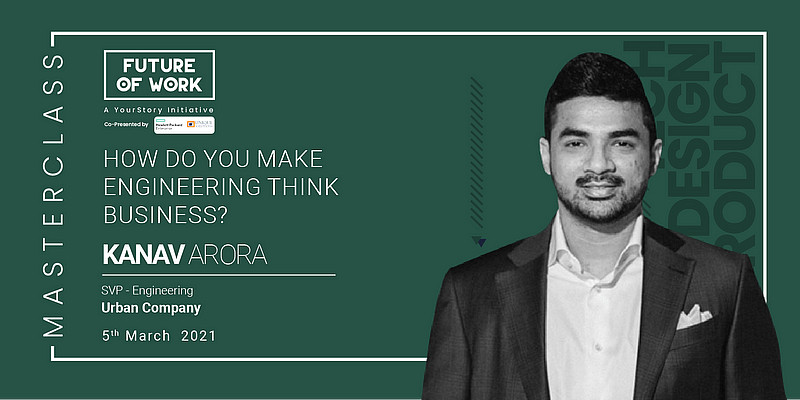“Even though a code is perfect, sometimes, it breaks. The flaw is often in the design – which is a digital representation of the physical world. This happens when you make assumptions about the physical world and those assumptions don’t hold true.”
Day 1 of YourStory’s Future of Work 2021 summit saw Kanav Arora, SVP Engineering, Urban Company, break down some engineering nuances through the topic, ‘How do you make engineering think business.’ As a true techie, Kanav has always believed that technology is the starting point for companies looking to solve real problems and create impact. In today’s session, he highlighted why business empathy is essential to achieve that.
Kanav now leads the experience arm of technology at the home services soonicorn, and is responsible for building the core technology for the platform, the app, and its multiple micro services.
In his masterclass session today, he deep dived into why business empathy is key to becoming a better developer, and what it takes to be one. Developer job profiles have changed over the years, and today the profile of a developer is not limited to just writing codes, he emphasised. According to him, the ability to understand business and leverage technology to align with business needs is an important skill set for developers to hone as they progress in their careers.
Sharing interesting pointers on how developers can be better business thinkers, Kanav pointed out that while there are structural changes at an organisational level that can enable this, there are ways that developers can develop empathy towards the business.
He underlined two simple things – talking and listening. Explaining this, he said, “There is a huge gap between engineering and business parlance.” While business talks engineering in terms of feature improvements and adding new features faster, developers look at it from the point of view of refactoring, scaling, maintenance – leading to a gap in communication.
“But, if we as developers were to just step back and look at it, it all boils down to risk, time and money – concepts that businesses understand. So, if we were to equate our work as engineers and developers to these three aspects, conversations will be more meaningful.”
He also advised engineers and developers to present various options and explain the pros and cons of each of the options instead of just saying whether a business request can be accommodated or not.
On the second aspect of what helps developers build business empathy, Kanav pointed towards – listening to internal and external users. He said, “Interacting with end users will give you a bottom-up understanding of how your product is used. It will help you gain insights which are otherwise impossible to get sitting in front of a laptop,” he shared.
“Technology’s role is not just to ship a product relevant for the business, but also empower internal stakeholders within the company. This will help to address challenges of different teams within the company, and will bring in enhanced efficiency.”
However, organisations have to play an active role too. He shared, “Organisations can bring in structural changes to enable developers to think and act from a business perspective rather than just an engineering perspective.” He shared the example of how Urban Company categorises its engineering teams into smaller pods, wherein each of the pods are solving a business challenge. Every developer is committed to solving an actual problem statement that is aligned to the business.”
Kanav highlighted that solving a business challenge is a two-way street. “While engineering needs to understand business, the business needs to appreciate tech, understand capabilities.”
Concluding the masterclass, he said, “While engineering must make an effort to understand the business, P0* is still very important. You need to ship high quality code. You cannot achieve impact if you are only business-driven.” He did however add, “If you are already writing high quality code, adding business empathy is sure to help you become a phenomenal developer.”
*P0 in software development is defined as something so critical to the release of the product that you would hold the release to include/fix it
A big shout out to our Future of Work 2021 Co-presenting Sponsors Hewlett Packard Enterprise and Unique Solutions; Digital Excellence Partner, Google Cloud; Associate Sponsor HP and Intel; and Sponsors: Atlassian, Freight Tiger, Archon I Cohesity, TeamViewer, and Pocket Aces.








![Read more about the article [Funding alert] EV startup Simple Energy raises $21M in oversubscribed pre-series round](https://blog.digitalsevaa.com/wp-content/uploads/2021/11/NewCopy4-1637737815734-300x150.jpg)


